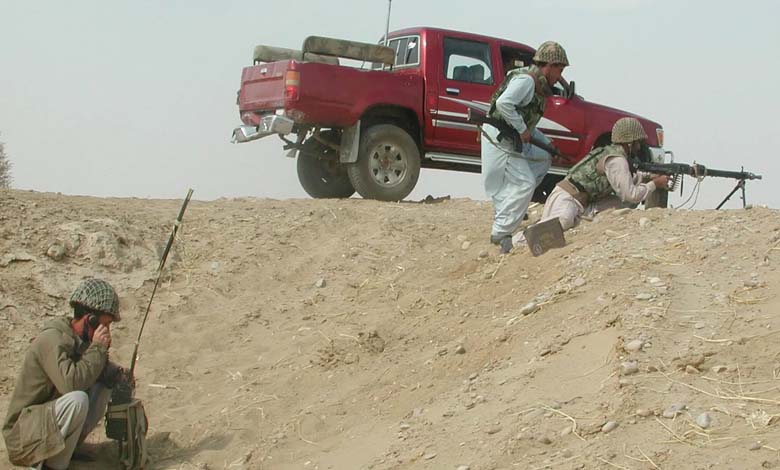Rescue of Members of the Qatari Royal Family from a Bombing in Pakistan
Two security sources confirmed the death of two Pakistani soldiers who were part of a military unit accompanying members of the Qatari royal family on a hunting trip, in a bomb explosion.

At least two Pakistani soldiers were killed on Wednesday in a bomb blast while accompanying members of the Qatari royal family on a hunting trip in southwest Pakistan, according to two officials.
The officials said the bomb exploded on a road in the city of Turbat in the Balochistan province.
-
New Terrorist Attack in Pakistan: Casualties and Injuries
-
Who is Amin al-Haq, Bin Laden’s Associate Arrested in Pakistan?
Abdulhamid, a senior official in Turbat, said, “Two members of the paramilitary border forces were killed in the explosion” and four others were wounded. He added that “the Qatari visitors are fine.”
The toll was confirmed by another local official who requested anonymity, explaining that “security reinforcements” were provided to the visitors after the explosion.
The sources did not immediately disclose the names of the Qatari royal family members who were on the trip, nor whether they were targeted.
-
Judicial Escalation: Imran Khan’s Party Faces Potential Ban in Pakistan
-
The UAE announces Nawaz Sharif’s victory in the Pakistani elections
Balochistan is Pakistan’s largest and poorest province, despite its rich resources of gas and minerals.
Baloch separatists are active in the region and regularly target security forces. Wealthy Gulf citizens, including Qataris, visit Balochistan in winter to hunt the houbara bustard with falcons.
The houbara bustard is classified as an endangered species, and animal rights activists in Pakistan have long criticized allowing wealthy falconers to hunt it.
-
Tehran refuses cooperation… Pakistan accuses Iran of harboring terrorist groups
-
Peshawar mosque bombing reveals insurgency within Pakistani Taliban
This is not the first time members of the Qatari royal family have faced serious incidents. In the past, 26 Qataris, including princes, were kidnapped in Iraq during a hunting trip. A Qatari official delegation conducted secret and arduous negotiations for over a year and four months, leading to an agreement in which Doha paid what is believed to be the largest ransom to an Iraqi militia loyal to Iran in exchange for the release of the Qatari hostages.
In 2018, the Washington Post revealed hacked documents showing that Qatar had paid hundreds of millions of dollars in ransom for royal family members who were kidnapped by Iraqi armed groups in 2015.
-
UAE-Pakistan relations enhanced by convergence of views on various issues
-
UAE’s achievements in Pakistan include projects and sustained economic and humanitarian support
The newspaper detailed in intercepted messages that “a senior Qatari diplomat said in one of the leaked messages that his country had entered into secret talks to free 25 of its citizens from Iraqi kidnappers, but the negotiations turned into a form of extortion. About six militias and foreign governments acted to press for more funds from Qatar.”
At the time, Qatar’s ambassador to Iraq and chief negotiator in the hostage case, Sheikh Zayed bin Said Al-Khayarin, wrote in an intercepted message, “The Syrians, Hezbollah, Lebanon, Kata’ib Hezbollah in Iraq, all want money; this is their chance… they’re all thieves.”
-
Pakistan’s first victim: Taliban terrorism in Afghanistan poses the greatest threat to neighboring countries
-
Analysts: Humanitarian efforts to support Pakistan flood victims reflect UAE approach
However, the secret documents revealed that despite this, the Qataris were willing to pay, and they did.
The secret records revealed for the first time that a “payment plan allocated an additional amount of $150 million in cash for individuals and groups acting as intermediaries in the deal, despite their disruptive role and contribution to the chaos in the region. U.S. officials have long viewed them as sponsors of international terrorism, including the Iranian Revolutionary Guard Corps, Hezbollah, and Kata’ib Hezbollah in Iraq, an Iraqi paramilitary group involved in numerous deadly attacks on U.S. forces during the Iraq War.”
-
Sheikh Mohamed bin Zayed orders urgent aid to Pakistan
-
Assassination of Pakistani Taliban leader threatens stability
The documents at the time showed that “the ransom was part of a larger deal involving the Iranian, Iraqi, and Turkish governments, as well as the Lebanese Hezbollah militia and at least two Syrian opposition groups, including the al-Nusra Front, a group linked to Al-Qaeda.”
The documents added that “the total amount demanded for the hostages’ return sometimes reached $1 billion, although it is unclear from the documents how much money was ultimately paid.”












